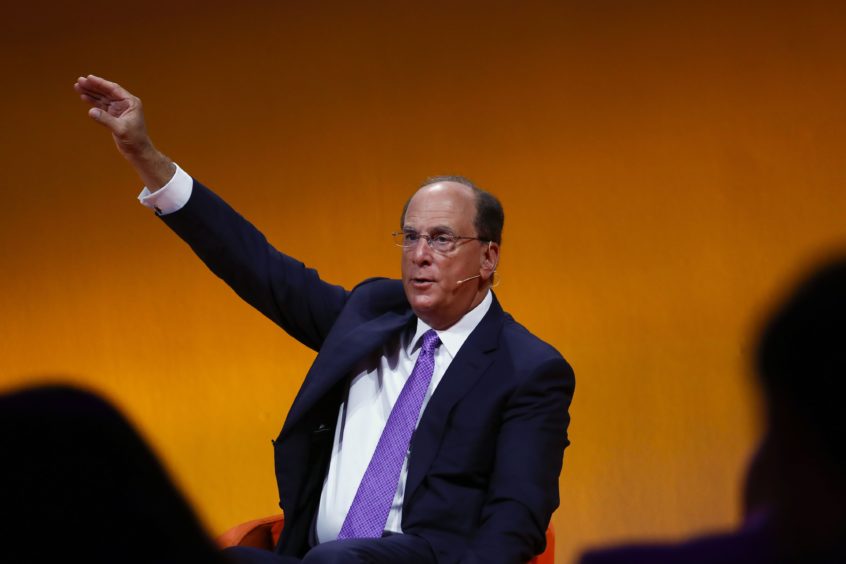
Larry Fink struck an urgent note in his annual letter to America’s corporate executives: Climate change will upend global finance sooner than they might think.
The BlackRock Inc. chief executive officer issued his strongest warning yet to business leaders on the climate crisis, and said his firm will take steps to address the issue across the thousands of companies in which it invests.
That may be harder than it sounds for a firm that holds more than two-thirds of its roughly $7 trillion of assets in products linked to indexes. Shifting holdings in those funds depends on what’s included in benchmarks determined by companies such as MSCI Inc.
Protesters have been trailing Fink to work, speaking engagements and formal events, decrying BlackRock for inaction on global warming and other issues. On Tuesday, he unveiled a specific set of climate-related changes to BlackRock’s investment processes.
“Climate change has become a defining factor in companies’ long-term prospects,” Fink wrote in his annual letter to corporate executives. “Awareness is rapidly changing, and I believe we are on the edge of a fundamental reshaping of finance.”
Public Stance
Fink is tackling the subject as asset managers come under greater pressure on sustainability, with BlackRock in particular facing increasing scrutiny for its behavior and voting record around environmental issues.
Among the changes outlined on Tuesday: making sustainability integral to portfolio construction and risk management; exiting investments that present a high sustainability-related risk; launching new investment products that screen fossil fuels; and strengthening the firm’s commitment to sustainability and transparency in its investment stewardship activities.
The company will exit both debt and equity investments in thermal coal producers in its active portfolios. The firm has about $1.8 trillion in active assets under management.
While changing the holding of index-tracking products could be tricky, BlackRock said it would undertake a number of steps to bring climate considerations to its passive funds.
The firm will double its lineup of sustainable exchange-traded funds to about 150, and pressure index providers to create sustainable versions of their flagship indexes, according to a client note outlining the changes.
Groups including Amazon Watch, the Sunrise Project, and coalitions of youth activists and parents have all targeted BlackRock recently, asking for more action around the global crisis of climate change.
BlackRock’s size puts it in a delicate position: operating in more than 30 countries, and as one of the biggest holders of most U.S. publicly traded companies, its clients include large sovereign wealth funds, state pension plans and financial advisers with viewpoints that don’t necessarily align on what to do about climate change and social justice issues.
Diana Best, a senior strategist for the Sunrise Project, a non-profit that seeks to rally organizations to advocate for climate change, said that Fink’s letter and BlackRock’s business changes set a good example.
“BlackRock’s new initiatives match the size of the crisis we’re seeing,” Best said in an emailed statement. “Putting climate change at the absolute center of its business is the way every company should respond to this planetary emergency.”
Non-profit Majority Action analyzed the 2019 proxy voting records of BlackRock and its peer Vanguard Group, and found the two firms voted against at least 16 climate-related shareholder proposals where their support could have given the measures majority support.
“The asset management industry is uniquely placed to help drive global decarbonization efforts, but it requires a concerted effort from all, not just the few,” said Alex Bibani, who manages a responsible investment fund at Sarasin & Partners in London. “We are pleased to see BlackRock making these positive steps and hope that others, such as Vanguard, follow suit.”
Fink’s letter, which mentions ‘climate’ 29 times, builds on previous missives advising corporate leaders on how to orient their businesses for the long term. In previous years he’s underscored the theme that profit and social purpose are inextricably linked, an idea he metnioned again in the latest letter. People are looking to corporate executives to step in and offer fixes to social problems that governments are failing to solve, Fink wrote last year.
Earlier in January, BlackRock joined Climate Action 100+, a group of more than 370 investment managers with a combined $41 trillion in assets that pressures greenhouse gas emitters to reform.
Recommended for you
